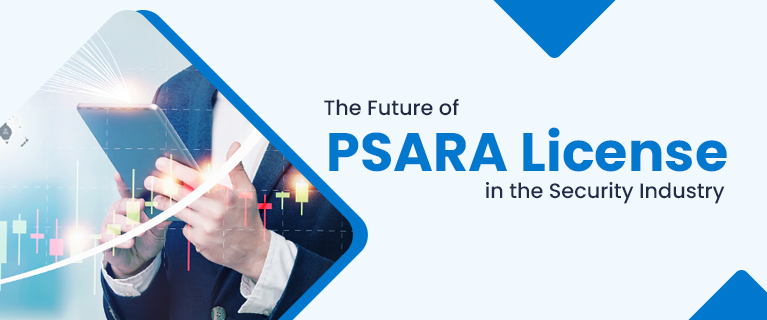The Future of PSARA License in the Security Industry
The private security industry plays a critical role in ensuring the safety and protection of individuals, businesses, and public spaces. The Private Security Agencies Regulation Act (PSARA) governs how private security firms must conduct their business in India. The PSARA License is a legal requirement for operating a security agency, and it sets the foundation for maintaining quality standards, professionalism, and accountability within the industry. As technology advances and security needs evolve, the future of the PSARA License holds immense potential for shaping the security industry. In this blog, we will explore the future of the PSARA License and its role in embracing technological advancements and meeting evolving security needs.
Read also this -: Exploring PSARA Licence for Inter-State Operations1. Integration of Technology:
The future of the PSARA License lies in the integration of advanced technologies into security operations. As the security landscape becomes increasingly complex, security agencies need to leverage technologies such as artificial intelligence (AI), machine learning, video analytics, facial recognition, and smart surveillance systems. The PSARA License can evolve to include provisions that encourage the adoption and implementation of these technologies, enhancing the effectiveness and efficiency of security services.
2. Enhanced Training and Skill Development:
As security threats become more sophisticated, there is a growing need for well-trained security personnel. The future of the PSARA License can focus on enhancing training and skill development programs to equip security personnel with the necessary knowledge and expertise. This can include specialised training in areas such as cybersecurity, risk assessment, crisis management, and conflict resolution. By investing in continuous training and upskilling, security agencies can ensure that their personnel are prepared to handle emerging security challenges.
3. Emphasis on Cybersecurity:
With the increasing reliance on technology in security operations, cybersecurity is becoming a paramount concern. The future of the PSARA License can incorporate cybersecurity guidelines and requirements to address potential vulnerabilities and protect sensitive information. Security agencies can be encouraged to implement robust cybersecurity measures, conduct regular audits, and adhere to industry best practices to safeguard their systems and client data.
4. Collaboration with Public Authorities:
The future of the PSARA License can promote increased collaboration between security agencies and public authorities. By fostering partnerships with law enforcement agencies, emergency response teams, and government bodies, security agencies can enhance their effectiveness in responding to security threats and crisis situations. Collaboration can include sharing intelligence, coordinating efforts during emergencies, and participating in community policing initiatives.
5. Embracing Data-driven Decision Making:
The digital age has provided security agencies with access to vast amounts of data. The future of the PSARA License can encourage the use of data analytics and insights to drive decision-making processes. By analysing data on security incidents, crime patterns, and risk assessments, security agencies can make informed decisions, allocate resources effectively, and proactively address security challenges.
6. Focus on Customer Experience:
In the future, the PSARA License can emphasise the importance of delivering an exceptional customer experience. Security agencies can differentiate themselves by providing personalised services tailored to the unique needs of each client. This can involve leveraging technology to offer real-time reporting, remote monitoring, and interactive communication channels. By prioritising customer satisfaction, security agencies can build long-term relationships and enhance their reputation within the industry.
7. Adaptability to Emerging Threats:
The security landscape is ever-evolving, with new threats and risks emerging regularly. The future of the PSARA License should enable security agencies to adapt to these changes effectively. This can include periodic reviews of license requirements to ensure they remain relevant and reflective of the evolving security landscape. By fostering an environment of adaptability and innovation, the PSARA License can enable security agencies to stay ahead of emerging threats and provide effective security solutions.
Read also this -: What are the Essential Conditions of PSARA LicenseConclusion
The future of the PSARA License holds great promise for shaping the security industry in India. By embracing technological advancements, enhancing training programs, emphasising cybersecurity, fostering collaboration, leveraging data-driven decision making, focusing on customer experience, and adapting to emerging threats, the PSARA License can contribute to a safer and more secure society. Security agencies that embrace these future-oriented aspects of the license will be well-positioned to meet the evolving security needs of individuals, businesses, and public spaces, ensuring a safer and more secure future for all.



Comments
Post a Comment